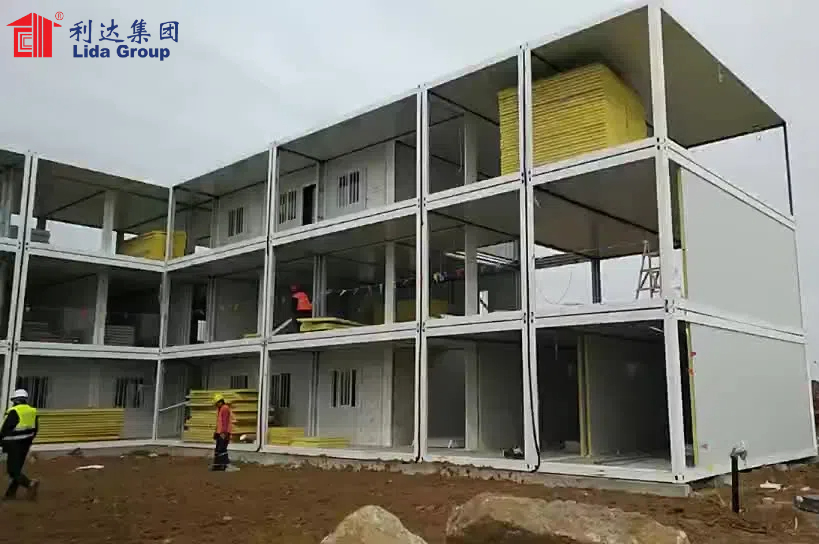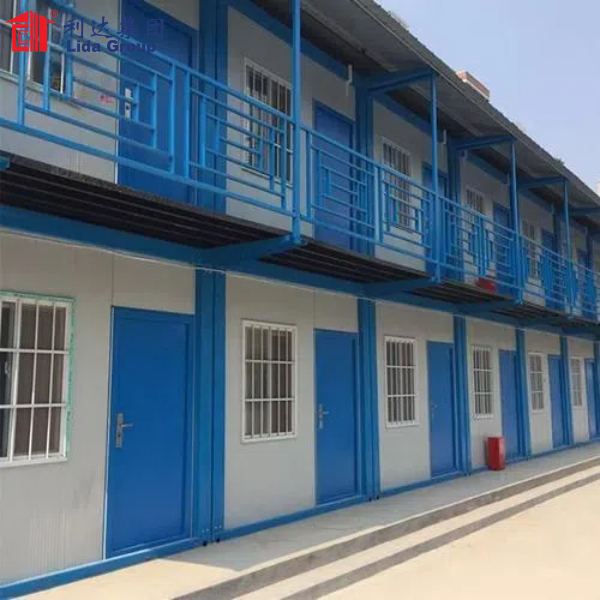Introduction
As urbanization accelerates and the demand for flexible living solutions rises, the construction industry is evolving to meet these challenges. Lida Group, a frontrunner in innovative building solutions, has introduced detachable container houses that redefine modular living. These structures offer a unique combination of mobility, adaptability, and sustainability, making them a viable option for various applications, from temporary housing to permanent residences. This article delves into the features, benefits, and future potential of Lida Group’s detachable container houses, showcasing their role in shaping modern living.
Understanding Detachable Container Houses
What Are Detachable Container Houses?
Detachable container houses are modular living units made from repurposed shipping containers. These units can be easily transported, assembled, and disassembled, allowing for flexible configurations and adaptability to different environments. The design enables users to create customized living spaces that can be expanded or reduced in size according to their needs.
The Concept of Modular Living
Modular living refers to a construction approach where buildings are made up of pre-fabricated sections or modules. This method offers several advantages:
- Speed of Construction: Modular units can be manufactured off-site and assembled quickly on location, significantly reducing construction time.
- Flexibility: Modular designs allow for easy modifications and expansions, accommodating changing needs over time.
- Cost Efficiency: Reduced labor and material costs associated with modular construction can lead to overall savings.
Benefits of Lida Group’s Detachable Container Houses
1. Versatile Design and Customization
One of the standout features of Lida Group’s detachable container houses is their versatility. Each unit can be customized to suit various lifestyles and preferences. Key aspects include:
- Flexible Layouts: Users can choose from various layouts, including open floor plans, multi-room configurations, or even mixed-use spaces that combine living and working areas.
- Modular Expansion: Additional containers can be added to expand the living space, allowing for easy adaptation as family sizes or needs change.
- Aesthetic Choices: Clients can select from a range of interior finishes and exterior designs, ensuring their container house reflects their personal style.
2. Quick Assembly and Mobility
Lida Group’s detachable container houses are designed for rapid deployment. The prefabricated nature of these structures allows for swift assembly on-site, making them ideal for various applications:
- Emergency Housing: In the aftermath of natural disasters, detachable container houses can be quickly set up to provide immediate shelter for those displaced.
- Remote Work Sites: Industries such as construction, oil, and gas can benefit from mobile living solutions, providing workers with comfortable accommodations in remote locations.
The mobility of these structures further enhances their appeal. They can be easily transported to different sites, allowing for relocation as needed.
3. Cost-Effectiveness
Cost efficiency is a significant advantage of Lida Group’s detachable container houses. Several factors contribute to their affordability:
- Reduced Material Costs: By repurposing shipping containers, the need for new building materials is minimized, leading to lower overall costs.
- Lower Labor Expenses: The prefabricated construction process reduces labor requirements, and quick assembly further lowers costs associated with time and resources.
- Minimal Site Preparation: Container houses often require less extensive site preparation compared to traditional construction, contributing to overall savings.
4. Sustainability and Environmental Impact
Lida Group is committed to sustainability, and its detachable container houses play a significant role in promoting eco-friendly living. Key sustainability features include:
- Recycling and Upcycling: Using repurposed shipping containers helps reduce waste and minimizes the environmental impact associated with traditional construction.
- Energy Efficiency: Container houses can be designed with energy-efficient features, such as high-quality insulation, solar panels, and energy-efficient appliances, reducing their carbon footprint.
- Sustainable Materials: Lida Group incorporates sustainable materials in the construction process, further enhancing the eco-friendliness of these homes.
5. Durability and Safety
Shipping containers are built to withstand harsh environmental conditions, making them inherently durable and safe. Key aspects of their durability include:
- Weather Resistance: Detachable container houses can endure extreme weather conditions, including high winds, heavy rain, and snow loads, ensuring occupant safety.
- Fire Resistance: The steel structure of shipping containers provides a level of fire resistance, enhancing overall safety.
- Robust Security: Container houses can be equipped with secure locking mechanisms and reinforced doors, making them safe for storage and living.
6. Comfort and Livability
While detachable container houses are often associated with temporary or transitional living, Lida Group prioritizes comfort and livability in their designs. Features that enhance comfort include:
- Insulation: Proper insulation ensures that container houses maintain a comfortable temperature year-round, reducing the need for excessive heating or cooling.
- Modern Amenities: Container houses can be equipped with modern amenities, including bathrooms, kitchens, and living areas, providing a comfortable living experience.
- Natural Light: Strategic placement of windows and skylights allows for ample natural light, creating a pleasant living environment.
7. Diverse Applications
Lida Group’s detachable container houses are suitable for a wide range of applications, making them a versatile solution for various sectors:
- Temporary Housing: Ideal for workers at remote job sites or for individuals needing transitional housing, these units provide comfortable accommodation without the need for permanent structures.
- Emergency Shelters: In times of crisis, these container houses can be deployed quickly to provide essential shelter for those in need.
- Recreational Use: Container houses can serve as vacation homes or glamping accommodations, offering a unique and stylish alternative to traditional lodging.
- Mobile Offices: Businesses can utilize detachable container houses as mobile offices, providing functional workspace in remote or temporary locations.
Case Studies: Successful Implementations of Detachable Container Houses
1. Disaster Relief Housing
In response to a natural disaster, Lida Group deployed detachable container houses to provide immediate shelter for affected communities. The rapid assembly and mobility of these structures allowed for quick response times, ensuring that displaced individuals had access to safe and comfortable living spaces.
2. Construction Site Accommodation
For a major construction project in a remote area, Lida Group provided detachable container houses to accommodate workers. The modular design allowed for easy expansion as the workforce grew, and the customized layouts met the specific needs of the project, enhancing overall productivity.
3. Eco-Friendly Glamping Resort
Lida Group partnered with a hospitality company to create an eco-friendly glamping resort using detachable container houses. The unique design and sustainable features attracted environmentally conscious travelers, demonstrating the versatility of container houses in the tourism industry.
The Future of Detachable Container Houses
1. Technological Advancements
As the demand for flexible living solutions continues to rise, advancements in technology will play a crucial role in the evolution of detachable container houses. Innovations may include:
- Smart Home Features: Integration of IoT devices for energy management, security, and convenience, enhancing the livability of container houses.
- Sustainable Building Practices: Continued focus on eco-friendly materials and construction methods will further improve the sustainability of container housing.
2. Expanding Market Opportunities
The growing awareness of the benefits of container houses will likely lead to expanded market opportunities across various sectors. Key trends may include:
- Urban Development: As cities grapple with housing shortages, detachable container houses may provide an affordable and efficient solution for urban living.
- Remote Work Trends: The rise of remote work may drive demand for portable living solutions, making detachable container houses an attractive option for professionals seeking flexibility.
3. Global Impact
Lida Group’s detachable container houses have the potential to make a significant global impact by addressing pressing issues such as housing shortages, disaster relief, and sustainable living. By promoting the use of innovative container solutions, Lida Group is contributing to a more resilient and adaptable future.
Challenges and Solutions in Implementing Detachable Container Houses
1. Regulatory Compliance
Building codes and regulations can pose challenges for container house construction. Lida Group addresses these challenges by:
- Thorough Research: Conducting extensive research to ensure all designs comply with local regulations and zoning laws.
- Engaging with Authorities: Collaborating with local authorities during the planning phase to streamline the approval process.
2. Public Perception
Despite their many advantages, container houses sometimes face skepticism due to misconceptions about aesthetics and livability. Lida Group tackles this challenge through:
- Showcasing Successful Projects: Highlighting successful implementations and testimonials from satisfied clients can help shift public perception.
- Education and Outreach: Providing information on the benefits and design possibilities of container houses to educate potential clients and communities.
3. Environmental Considerations
While container houses are generally more sustainable than traditional homes, there are still environmental considerations to address, such as:
- Material Sourcing: Ensuring that materials used in construction are sustainably sourced and environmentally friendly.
- Energy Efficiency: Continuously improving energy efficiency measures in container houses to minimize their environmental impact.
Conclusion
Lida Group’s detachable container houses represent a transformative approach to modern living and working spaces. With their versatility, cost-effectiveness, sustainability, and adaptability, these structures offer numerous benefits for individuals, businesses, and communities alike.
As the demand for flexible and efficient housing solutions continues to grow, Lida Group is well-positioned to lead the way in providing innovative container house solutions that meet the diverse needs of today’s world. Through a focus on safety, comfort, and sustainability, Lida Group is shaping the future of modular living, ensuring that detachable container houses become a viable and attractive option for various applications.
In an era where adaptability and resilience are paramount, detachable container houses stand out as a solution to pressing challenges in housing and urban development. Their potential to reshape the way we live, work, and interact with our environments is vast, promising a more efficient and sustainable approach to housing in the years to come.
Contact Us
Post time: Oct-15-2024


